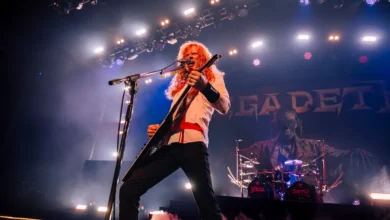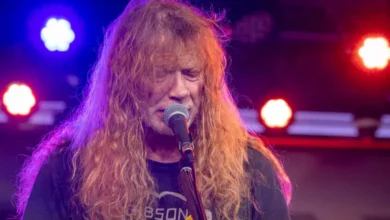Rock Singer Goes Viral With Incredible Metal Version of “I Will Always Love You”
When Swedish rocker Erik Grönwall decided to tackle I Will Always Love You, he wasn’t chasing an easy viral moment; he was aiming straight at one of the most intimidating songs in modern pop history, a song tied forever to Dolly Parton’s writing genius and Whitney Houston’s unmatched vocal summit.
The setup was disarmingly simple. No arena pyros, no TV talent show back-story package, no auto-tuned studio gloss—just Grönwall, a small live-room environment, and a song everyone in the room already knew by heart. That intimacy raised the stakes. When an artist sings something this famous in that close a setting, every vowel, every breath, every tiny swell in the chorus becomes a make-or-break moment because the audience can’t hide behind production. They hear everything. And he knew it.
Part of what made the performance land so hard was the story Grönwall is carrying into every stage appearance now. This is someone who fought acute lymphoblastic leukaemia in 2021, returned, then stepped away from Skid Row in March 2024 to prioritise health and reinvention. When a singer with that kind of lived vulnerability steps into a lyric about saying goodbye while still loving someone, the words stop being theoretical. They sound like someone singing from the other side of a tunnel.
Musically, he played it smart. Rather than going full rock right away, he opened almost reverently, closer to Dolly’s tenderness than Whitney’s hurricane, letting the melody glow on its own so the audience could recognise it and relax. You could hear him shape the consonants cleanly, keeping the Swedish lilt but not letting it distract, and the guitar accompaniment stayed in a supportive lane. That early restraint was key because it made what came next feel earned instead of showy.
Then came the pivot that made the video explode online: the slow, confident escalation into a rock-style belt. Once the chorus hit, Grönwall didn’t try to imitate Whitney’s exact phrasing—that would have been a losing game anyway—but he mirrored the emotional architecture of her version: quiet ache, then widening heartbreak, then open-throated declaration. Only he did it with the metallic edge his fans love him for, the same engine that powered him through H.E.A.T anthems. It was like watching a rock singer sneak into a pop cathedral and discover the acoustics were made for him.
Online reaction showed how unusual this crossover really was. Comment sections filled up with people saying things like “never heard this sung by a guy…and now I don’t want to hear it any other way,” and even playful notes like “Whitney just gave a standing ovation,” which is fandom-speak for “this should not have worked, but it absolutely did.” You only get that kind of reaction when the audience feels you respected the original while still putting your flag in the ground.
It also helped that Grönwall made a point—implicitly, through the performance—of honouring both lineages of the song: Dolly the writer, who first recorded it in 1973, and Whitney the globaliser, who turned it into a world-shaking single in 1992. Rock fans don’t always get to show that they know pop history, but this cover quietly did that: it said, “I know whose house I’m in.” That sort of lineage awareness is one reason the clip travelled beyond his usual metal/hard-rock audience.
What really separated this from a lot of YouTube covers, though, was dynamic control. Grönwall didn’t stay loud. He swelled and retreated, using the verses almost like a confession and the choruses like a release valve. On the second big chorus, he let the rasp creep in just enough to remind everyone, “yes, I’m still the guy who can front a metal band,” but not so much that it broke the emotional spell of a goodbye song. That balancing act—power without bulldozing—was the professional trick.
Another layer people responded to was the setting itself. This wasn’t a big corporate tribute special; it was closer to his book-release and 100k-subscriber celebration vibe in Sweden—music being shared among people who already knew him, cameras close, no giant TV crane shot to distract. So when he hit the climactic “and I…,” it felt like being in the room when someone does something a little too big for the room, and everyone instinctively leans back and grins because they know they’re witnessing a keeper.
There’s also the simple novelty factor: a male tenor with rock pedigree taking on a song that pop culture coded as a female vocal Everest. That alone sparks shares: “have you seen this guy sing Whitney?” But novelty doesn’t get you to millions of views; sincerity does. He kept his eyes and phrasing locked into the lyric like he was singing to one person, not the internet. That choice made the high notes feel like confessions rather than vocal Olympics, which is a subtle but crucial difference.
Industry watchers caught another angle: Grönwall has been steadily posting classic covers—Dio, Black Sabbath, Queen, the stuff his fan-base eats up—and this song slotted neatly into that content stream while widening it. It signalled that post-Skid Row, he’s not retreating; he’s experimenting in public, building a solo-era identity on authenticity and versatility. You could almost hear him saying, “I’m not just the guy who can scream; I’m the guy who can tell a story at a whisper and still knock down the wall when needed.”
For longtime followers who remember his 2009 Swedish Idol win, the whole moment felt circular. Back then, audiences loved him because he could take well-known songs and inject them with arena-sized energy without losing their heart. Fifteen years later, he’s doing the same thing, only now with decades of lived experience, illness, comeback, and global touring inside the voice. In that sense, I Will Always Love You wasn’t just a cover; it was a career update sung in code.
One underrated piece of magic was how he handled the song’s core message. Dolly wrote it as a gracious, grown-up farewell—“I will move on, but I will do it with love.” Whitney sang it like a love so overwhelming it can barely survive separation. Grönwall’s version sat in between: firm and adult like Dolly, but emotionally saturated like Whitney, only filtered through a rock singer who knows what it means to let go of a band, a season, even a version of his own body. That’s why it rang true.
The clip’s spread across Facebook groups, rock pages, and even general inspiration sites also tells you something about genre walls in 2024–2025: fans don’t care anymore. If it’s good and it gives them goosebumps, they’ll share it. Grönwall gave them the universal goose-bump moment—the quiet opening, the breath before the climb, the triumphant belt, the softened landing—and people posted it the way they’d post a military homecoming or a surprise duet with a legend. It became a feelings video, not just a music video.
In the end, the reason this performance felt special is simple: it was risk plus narrative plus craft. Risk, because rock singers don’t usually touch this song in public. Narrative, because viewers knew he’d been through serious health challenges and a high-profile band exit. Craft, because he structured the performance to grow, not just blast. When those three line up, you don’t just get a nice cover—you get a clip that makes people say, “send this to Dolly.” And many of them did.
Grönwall’s creative momentum didn’t stop there. Shortly after the viral success of his I Will Always Love You cover, he delivered a thunderous reinterpretation of Billy Idol’s White Wedding, transforming the 1980s punk-rock staple into a modern metal spectacle. With crunching guitars, fierce drums, and a stage presence radiating confidence, he captured the rebellious energy of the original while giving it a fresh metallic pulse. His growling vocals, explosive transitions, and sly charisma paid tribute to Idol’s legacy but pushed the track into a heavier, more cinematic dimension, proving again that he can reforge classics without losing their soul.
Then came a completely different emotional turn with his moving take on Robbie Williams’ Angels, recorded on Hamburg’s legendary Reeperbahn. Gone were the walls of distortion; in their place stood raw honesty and warmth. The performance blended street ambiance with heartfelt vulnerability, making the city itself feel like part of the song. Grönwall’s voice soared through the night air, tender yet unbreakable, captivating onlookers who stopped to listen. It was a reminder that behind the fire and grit of his metal persona lies a storyteller capable of turning even the quietest moments into something unforgettable.





